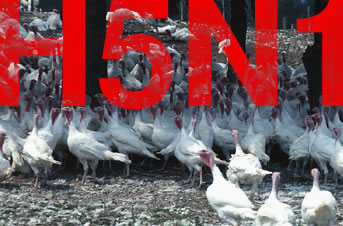Feb 8 2007
 Scientists in Britain investigating the outbreak of bird flu in a flock of turkeys in Suffolk now say there may be a link with an outbreak in Hungary in January.
Scientists in Britain investigating the outbreak of bird flu in a flock of turkeys in Suffolk now say there may be a link with an outbreak in Hungary in January.
These latest comments contradict statements by British officials in Brussels earlier in the week that it was unlikely there was a Hungarian link.
The British government now says there is a possible connection and investigations have shown that one possible route of infection is poultry products imported from Hungary.
The outbreak in Suffolk was on a farm owned by the poultry giant Bernard Matthews whose also has large farms in Hungary.
Hither too any connection between the current outbreak in Britain and the one in Hungary have been strongly repudiated by both the company and government officials.
Officials in Britain say the company has voluntarily agreed to temporarily suspend the movement of poultry products between their outlets in the UK and Hungary until the investigation is complete.
The cull of the remaining 160,000 turkeys on the farm in Suffolk was completed on Monday.
Five countries have now banned poultry imports from Britain, among them Russia and Japan.
Bernard Matthews, Europe's largest turkey producer, now has a 3km protection zone and a 10km surveillance zone in place around the Holton farm.
Poultry owners in a wider restricted zone, covering 2,090 sq km around Holton, have been told to keep their flocks isolated from wild birds.
All three workers involved in dealing with the bird flu outbreak on the Suffolk farm have tested negative for the disease and the Health Protection Agency (HPA) does not expect any of the workers to develop the deadly virus.
The HPA emphasises that H5N1 remains predominantly a disease of birds which does not transmit easily to humans and there has been no evidence to date that the virus can pass easily from human to human.
According to the World Health Organisation (WHO) the H5N1 strain of bird flu has infected over 270 people, mainly in South East Asia, and has killed 166.
Experts remain concerned that the virus could mutate and develop the ability to transfer between humans triggering a flu pandemic with the potential to kill millions.